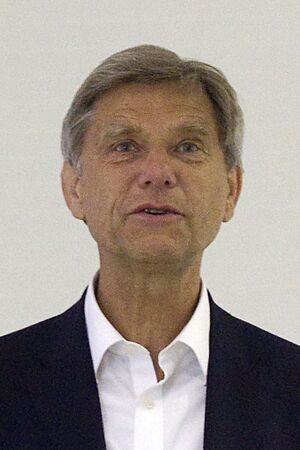Hermann Hauser facts for kids
Quick facts for kids
Hermann Hauser
|
|
|---|---|

Hauser in 2010
|
|
| Born |
Hermann Maria Hauser
23 October 1948 Vienna, Austria
|
| Education |
|
| Known for | |
| Spouse(s) | Pamela Raspe |
| Awards | |
| Scientific career | |
| Institutions |
|
| Thesis | Mechanically Activated Chemical Reactions (1977) |
Hermann Maria Hauser is an inventor, entrepreneur, and investor from Austria. He was born in 1948. He is well-known for his work in the technology world, especially in Cambridge, England. He has helped start many important tech companies.
Contents
Early Life and Learning
When Hermann Hauser was 16, he traveled to the United Kingdom. He went to a language school in Cambridge to learn English. Later, he earned a master's degree in physics from Vienna University. He then returned to Cambridge. There, he studied for his PhD in physics at the Cavendish Laboratory.
Building Tech Companies
Hermann Hauser is famous for helping to create Acorn Computers in 1978. He started this company with Chris Curry. Acorn Computers made early personal computers. In 1985, another company called Olivetti took over Acorn. Hauser then became a research leader for Olivetti. He managed their research labs in the US and Europe.
Olivetti Research Laboratory
In 1986, Hauser co-founded the Olivetti Research Laboratory (ORL) in Cambridge. He worked with Andy Hopper on this project. The ORL became a place for new technology ideas. Hermann Hauser's role in Acorn was even shown in a BBC drama called Micro Men.
The Active Book Company
In 1988, Hauser left Olivetti to start his own company, the Active Book Company. He invested a lot of his own money into it. The company wanted to create a small, portable computer. It was designed to be about the size of a paperback book. This device would have a screen and a special pen to interact with it. It was called the "Active Book."
The Active Book was meant to cost around $2,000. It could run for eight to ten hours on battery power. Hauser wanted to share this technology widely. He showed the Active Book to many large companies. In 1991, AT&T Corporation bought the Active Book Company. They used its ideas in their own device, the EO Personal Communicator. However, this product did not sell as well as hoped.
Advanced RISC Machines (ARM)
In 1990, Hauser helped create Advanced RISC Machines (ARM). This company was spun out of Acorn. ARM designs microchips that are used in many devices today. These include smartphones and tablets. In 2016, a Japanese company called SoftBank bought ARM Holdings.
Other Ventures
Hermann Hauser has started many other companies. In 1993, he set up Advanced Telecommunication Modules Ltd with Andy Hopper. This company was later bought by Conexant Systems. He also founded NetChannel Ltd in 1996. This company was sold to AOL in the same year.
In 1997, he co-founded Amadeus Capital Partners. This is a company that invests money in new businesses. In 1998, he also helped start Cambridge Network. This group connects businesses and people in the Cambridge area.
In 2000, Plastic Logic was founded, with Hauser as its chairman. He also supported Solexa, a company that developed advanced DNA sequencing technology. This technology helps scientists understand DNA better. Solexa was sold to Illumina, Inc. in 2007.
Hermann Hauser continues to support new companies. Since 2015, he has invested in Austrian start-ups. In 2022, he invested in planqc, a quantum computing company in Munich.
Awards and Recognition
Hermann Hauser has received many awards for his contributions to technology. In 1984, he was named the UK's "Computer Personality of the Year." In 2010, he was listed among the "100 most important scientists" by Eureka magazine.
He became a patron of The Centre for Computing History in 2011. This was 30 years after the famous BBC Micro computer was launched. In 2002, he became a Fellow of the Institute of Physics. He also became an International Fellow of the Royal Academy of Engineering.
In 2005, Hauser received a Lifetime Achievement Award. This award recognized his work as an investor and entrepreneur. He was also given an honorary CBE in 2001. This was for his great service to UK businesses.
In 2012, Hauser was elected a Fellow of the Royal Society (FRS). This is a very high honor for scientists. In 2013, he was also elected a Distinguished Fellow of the British Computer Society. This recognized his important work in computer science in the UK.
 | Lonnie Johnson |
 | Granville Woods |
 | Lewis Howard Latimer |
 | James West |

